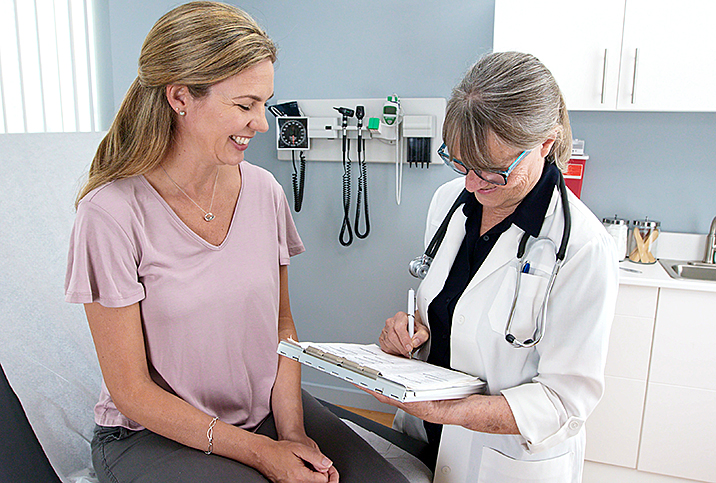Finding an OB-GYN at College

Heading off to college can be an exciting yet daunting experience for many young women. You may feel anxiety surrounding friendships, routines, classes and studying. On top of that, you may experience new thoughts and emotions around independence, relationships and sex.
Some tasks can easily slip your mind in the process of this major life change that may involve moving across the country. It's important, though, to add "Find an OB-GYN" to the top of your checklist. Here's what you should look for when choosing an OB-GYN and how to prepare for that first visit.
Research your options
Finding the right OB-GYN begins with knowing what to look for and researching your options.
Start by searching for physicians in your school's area. Look at their websites to find out what they specialize in and their primary focus, suggested Megan Gray, M.D., an OB-GYN at Orlando Health Physician Associates.
Contrary to what you might think, finding an OB-GYN isn't a one-size-fits-all approach. For instance, if their focus is on menopausal medicine or pregnancy and you don't fit those criteria, then you probably won't be a good match.
Ask friends, family members or fellow students for their own experiences and recommendations.
It's important that you get along well with your OB-GYN, because you will need to have open conversations with this person. They should be trustworthy and nonjudgmental and offer a safe space.
Gray suggested you ask friends, family members or fellow students for their own experiences and recommendations, as the people closest to you are more likely to give you their honest thoughts. Online reviews can also be helpful when doing your research, but you shouldn't rely solely on strangers' reviews.
"Remember that online reviews are fraught with inaccuracy. Most people don't take the time to leave positive reviews when they have had a good experience," Gray said. "Look for a doctor that may have the same values you have."
How to prepare for the first visit
It can be nerve-wracking to make the first appointment, but you can make the process easier by preparing for it.
"In my opinion, the best thing you can do is prepare for your appointment by making a list of topics you would like to discuss and key questions that you may have," said Erica Montes, M.D., a board-certified OB-GYN in Phoenix, an Organon spokesperson and the founder of the bilingual health blog the Modern Mujer.
Making a list of your questions gives you talking points, which will help you stay on track and ensure your needs are met.
Gray suggested starting the visit with, "Hi, nice to meet you, Dr. X. I have a few questions and concerns. At what point in the visit would you like to address those with me?" This allows you the opportunity to discuss those concerns immediately or revisit them toward the middle or end of the appointment. No question should go unanswered.
Many young women put off appointments out of fear, embarrassment or anxiety. These feelings can be alleviated by finding an OB-GYN who makes you feel comfortable.
"If you are seeing a female for your care, they have all been in your shoes at one point in their life, so they can relate to many of your concerns and questions," Gray reassured. "It is OK to communicate to your physician that you are nervous."
Similarly, talking about sexual and reproductive health can be uncomfortable for some college-age women, but Montes encourages women to speak up on the topics important to them.
"I know it can be hard to ask certain questions, address concerns or share what you need," she said. "But know that when I work with my patients, I try to create a comfortable space where we can engage in a discussion."
Discussing contraception
College-age women should plan to discuss birth control if they are sexually active or plan to become sexually active.
"It's important to find someone who will provide you with access to contraceptive information to help you understand your options and prioritize your reproductive health," Montes said. "Birth control discussions should always be an open dialogue to help ensure that your needs are addressed."
You may be able to visit your university's health center to discuss forms of birth control, Montes continued.
"If birth control isn't provided at the school's health center, women can find a clinic or doctor in their area or can look for telehealth options," she said.
Montes recommends that you find out from your doctor what methods of birth control are available, how each type works, the risks associated with each method and what is covered under your insurance.
There are other factors to consider as well, such as daily versus non-daily contraception. Your doctor can ask you questions related to your lifestyle and health to help you determine the best option for you. Remember, you can change your birth control option at any point. If you experience unpleasant side effects or any other problem, just let your OB-GYN know so they can talk to you about alternatives.
What to expect at the visit
During your first OB-GYN visit, you may be weighed, examined and screened for common sexually transmitted infections (STIs), Gray said. If you are 21 or older, your doctor may advise a Pap smear to check for abnormal cells of the cervix that may indicate cervical cancer or precancer. In addition, they may perform a pelvic exam to get a feel for your cervix, uterus and ovaries, and to rule out any abnormalities.
You should use this opportunity to find out what tests your doctor recommends, how frequently you need to visit and how test results are reported to you.
Your menstrual cycle is important. It can often be an indicator of your overall health and whether you could be suffering from a reproductive disorder. Be sure to let your doctor know how often you cycle, how heavy your periods are and whether you have any pain associated with your cycles, Gray said.
Your doctor is there to help, so no question is off-limits. And if, for whatever reason, you don't feel entirely comfortable with this doctor, it's OK to keep searching until you find one that aligns with your specific needs and healthcare goals. Your sexual health is important, and you deserve a physician with whom you're comfortable.



















